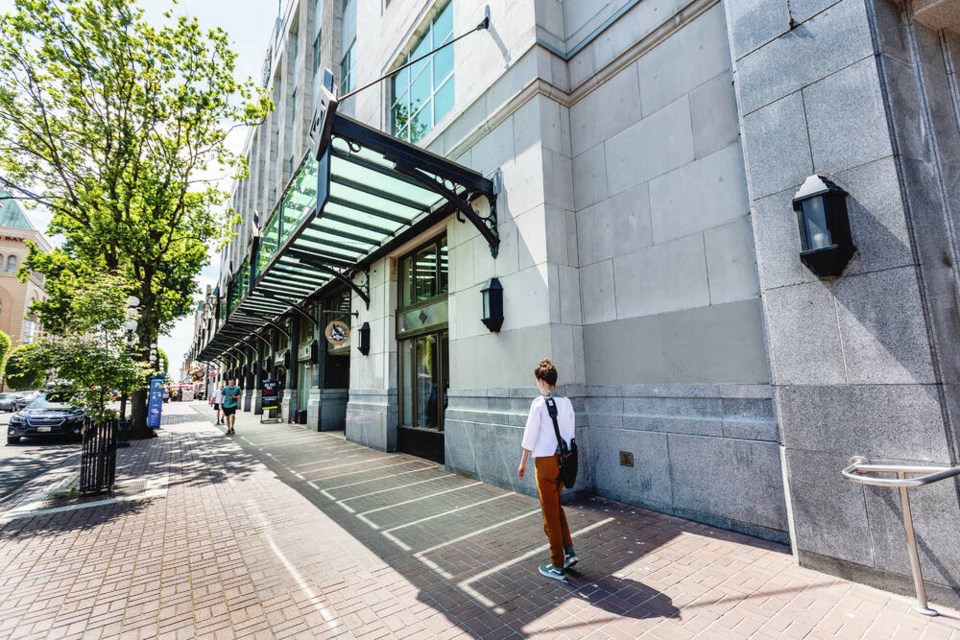Walking around downtown Victoria, I am reminded of Florida governor Ron DeSantis’s comments after forcing through another bunch of terrible, base-friendly laws because … uh, I’m guessing Freedom (?) or maybe Oranges (?).
Anyway, here’s what Meatball Ron said with a totally straight face: “…we are going to remain a refuge of sanity and a citadel of normalcy.”
Okay, wait a minute. I once lived in the Sunshine State and I can say with complete confidence that no matter your race, creed or colour, Florida is definitely NOT a refuge of sanity. Same for the part about being a citadel of normalcy. It’s really, really not that.
Florida’s sweet spot in the pantheon of weirdo states has traditionally been “Huh? LOL,” or more formally “Seriously, what the heck is going on here?” And that’s exactly what comes to mind walking around certain parts of downtown Victoria.
Where is everybody? I don’t mean — and here I want to be circumspect given how touchy and letter-writey everybody is — the people of Pandora Avenue. They are legion. No, I mean regular people out for lunch or a dog walk or shopping for capri pants. Seriously, what the heck is going on here?
It’s not just Victoria. Not even downtown Port Hardy is what it once was (temperate rain forest).
But my point is that Victoria, the provincial capital, has many government workers (about half of B.C.’s 36,000 provincial employees are based in Victoria and about a third in Vancouver), a good chunk of whom are no longer working in downtown office buildings.
They now work in the laundry room, or at the kitchen table once the kids have gone to school/bed/band camp.
Working from home became more acceptable during the COVID-19 pandemic, which you may have heard and/or coughed about. During those two years of existential anxiety, we proved it is possible to do most jobs without Susan from accounting spit-talking on you in the elevator.
Of course, for many employees working from home is not an option. Due to the nature of the job, elevator repairmen, thoracic surgeons, kindergarten teachers and many others have to wear pants and trudge into their respective salt mine every day whether they like it or not.
You may love working from home because of the freedom and productivity gains, or hate it because you own cats, or are easily distracted by the allure of vacuuming.
I happen to prefer working from home, where I set the office culture (pants optional, Paul Desmond on the hi-fi, and YES! to a wee dram in the morning coffee).
Another major benefit is I do not have to share close quarters with the kind of lowbrow reprobates who do what I do. On the other hand, my wife prefers to work from a downtown office precisely because of the home office culture and aforementioned reprobates.
Perhaps you haven’t yet made up your mind about working from home, and need a trustworthy guide to help navigate all the modern work options. If you find one, please let me know because that sounds quite helpful.
In the meantime, here are a few pros and cons to consider:
PRO: no commute! Swap the twice-daily hour-long white knuckle drive over the Malahat for a 20-second amble from the bedroom to the kitchen table.
Roll out of bed, lick your hair into shape and start the morning Microsoft Teams internet call. Not only does working from home save time (one estimate, calculated by using actual mathematics, determined the average worker will save 12,075 hours of commute time, or 1.3 years), it also saves money (no gasoline, no parking, no bus pass, no speeding tickets, no car repairs, no jail time), and means a lower carbon footprint (more calculations involving mathematics estimate the average person will save 55.5 metric tons of CO2, which sounds very heavy to me).
PRO: decreased stress. Let’s face it: your boss and colleagues are a handful, and the less time spent in their company, the better. Working from home means you can take a quick nap when you need to de-stress, like after Colin in communications emails another video of BC Hydro dam construction “because it is interesting.”
Also, no prying eyes are watching your every move and judging when you dance around the room to Taylor Swift AS IS YOUR FUNDAMENTAL HUMAN RIGHT.
CON: higher home costs. Working from home means you now have to pay for heat, lighting, internet, water, paper, pens, chairs and the other office equipment you used to casually steal from the supplies cabinet.
CON: lower prospect for promotion. Not being in the office in person can negatively impact the relationship-building process that sets the groundwork for promotion and/or sexual misconduct accusations.
We are social beings, and the degree to which one progresses in a career is often related to being social at work. Obviously this is not relevant if you keep the negatives and a set of naughty prints somewhere safe, off-site.
So many people now working-from-home/catching-up-on-laundry means there has been a huge impact on downtown business, tourism and culture.
But many other forces were already at work to create today’s Pandora Avenue and make downtown less fun. It’s no longer the place Petula Clark recommends to listen to the music of the traffic in the city, nor linger on the sidewalk where the neon signs are pretty.
Nope, downtown is not a refuge of sanity and a citadel of normalcy, but maybe it can be. And if that happens, a lot of work-from-homers will be back for coffee, lunch and capri pants.
>>> To comment on this article, write a letter to the editor: [email protected]



